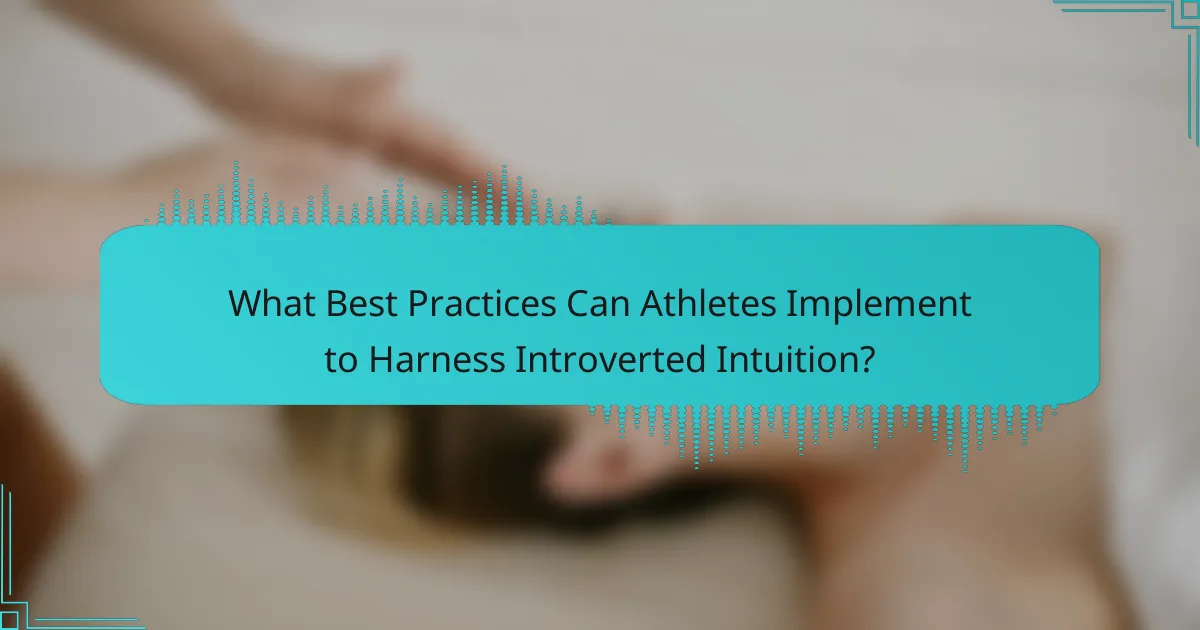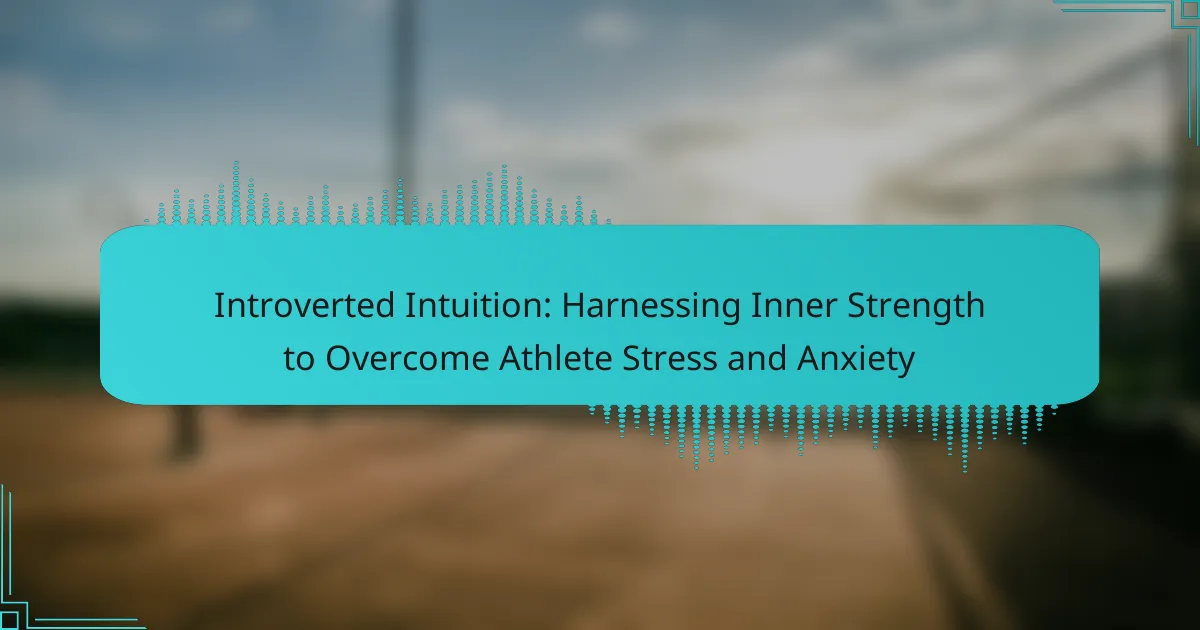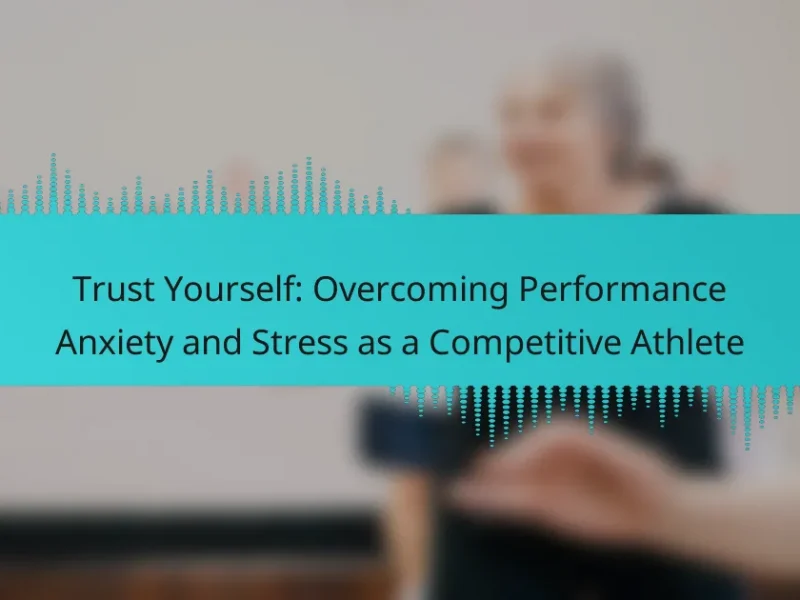Athletes often face stress and anxiety that can hinder performance. Introverted intuition provides a pathway to manage these challenges through enhanced self-awareness and decision-making. By engaging in self-reflection and visualization techniques, athletes can identify stress triggers and develop effective coping strategies. This cognitive function fosters resilience, enabling athletes to maintain composure and improve performance under pressure.

What is Introverted Intuition and How Does it Relate to Athletic Performance?
Introverted intuition helps athletes manage stress and anxiety by tapping into their inner strengths. This cognitive function allows athletes to process experiences deeply, leading to enhanced focus and decision-making during competitions. By understanding their internal landscape, athletes can better anticipate challenges and maintain composure under pressure. Research indicates that athletes who harness introverted intuition often report improved mental resilience and performance consistency. This unique attribute fosters a strategic mindset, enabling athletes to visualize outcomes and adapt their strategies effectively.
How can Introverted Intuition help athletes manage stress and anxiety?
Introverted intuition helps athletes manage stress and anxiety by enabling deep self-reflection and insight. This mental process allows athletes to anticipate challenges and develop coping strategies. By focusing inward, athletes can identify triggers and reduce anxiety through mindfulness techniques. Research shows that athletes who harness their introverted intuition report improved performance and resilience under pressure. This unique attribute fosters a strong mental framework, enhancing overall well-being and competitive edge.
What are the key characteristics of Introverted Intuition?
Introverted Intuition is characterized by deep introspection, foresight, and a focus on internal insights. This cognitive function allows individuals to process complex ideas and patterns, often leading to innovative solutions. Key characteristics include a preference for abstract thinking, a tendency to connect seemingly unrelated concepts, and an ability to foresee potential outcomes. This unique attribute enhances an athlete’s mental resilience, enabling them to manage stress and anxiety effectively.
What role does self-awareness play in coping with athlete stress?
Self-awareness significantly enhances an athlete’s ability to cope with stress and anxiety. It allows individuals to recognize their emotions, triggers, and responses to pressure. This understanding fosters emotional regulation, enabling athletes to manage their stress levels effectively. Research indicates that self-aware athletes are better equipped to develop coping strategies, leading to improved performance and mental resilience. By harnessing their inner strengths, they can transform stress into a motivating force rather than a debilitating one.
How does reflective thinking contribute to emotional resilience?
Reflective thinking enhances emotional resilience by enabling individuals to process experiences and emotions. This practice fosters self-awareness, allowing athletes to identify stress triggers and develop coping strategies. By reflecting on past challenges, athletes can build confidence in their ability to handle future stressors. Moreover, reflective thinking promotes a growth mindset, encouraging athletes to view setbacks as opportunities for learning and improvement. This adaptive approach ultimately strengthens their emotional resilience, enabling them to navigate the pressures of competition more effectively.

What Universal Benefits Does Introverted Intuition Offer Athletes?
Introverted intuition offers athletes enhanced self-awareness, improved decision-making, and stress management. This cognitive function allows athletes to tap into their inner strengths, fostering resilience against anxiety. Athletes utilizing introverted intuition can visualize outcomes, leading to more strategic performance under pressure. This unique attribute helps athletes remain focused and calm, ultimately enhancing their competitive edge.
How can enhanced focus improve athletic performance?
Enhanced focus significantly boosts athletic performance by reducing stress and anxiety. Athletes with improved focus can maintain composure under pressure, which leads to better decision-making and execution of skills. This mental clarity allows for more effective training and competition, enhancing overall performance. Research indicates that focused athletes exhibit greater resilience, leading to consistent results in high-stress situations. By harnessing inner strength through techniques like visualization and mindfulness, athletes can cultivate enhanced focus, ultimately transforming their competitive edge.
In what ways does intuition support decision-making under pressure?
Intuition enhances decision-making under pressure by providing quick, instinctive insights. This ability allows athletes to process complex information rapidly, leading to effective responses in high-stress situations. For instance, introverted intuition enables athletes to tap into past experiences, drawing on subtle cues that inform their choices. This unique attribute fosters confidence, reducing anxiety and improving performance when stakes are high.

What Unique Attributes of Introverted Intuition Can Athletes Leverage?
Athletes can leverage unique attributes of introverted intuition to enhance focus and decision-making under pressure. This cognitive function allows athletes to tap into their inner insights, fostering a deeper understanding of their performance and mental state.
By prioritizing self-reflection, athletes can identify stress triggers and develop strategies to manage anxiety effectively. This introspective approach enables them to visualize success and maintain composure during high-stakes situations.
Additionally, introverted intuition promotes a holistic perspective, allowing athletes to connect their experiences and emotions. This connection can lead to improved resilience and adaptability, crucial traits for overcoming challenges in competitive environments.
Ultimately, harnessing introverted intuition can significantly enhance an athlete’s mental fortitude, leading to sustained performance and well-being.
How does the ability to foresee potential challenges aid in preparation?
The ability to foresee potential challenges enhances preparation by enabling proactive strategies. Introverted intuition allows athletes to anticipate stressors and anxiety triggers. This foresight cultivates resilience, fostering mental strength and focus. Athletes can develop tailored coping mechanisms, improving performance under pressure. As a result, they navigate obstacles with confidence, transforming challenges into opportunities for growth.
What strategies can athletes use to tap into their intuitive insights?
Athletes can enhance their intuitive insights through mindfulness, visualization, and reflective practices. Mindfulness helps athletes tune into their thoughts and feelings, fostering awareness of their inner strengths. Visualization techniques allow athletes to mentally rehearse scenarios, tapping into their subconscious for guidance. Reflective practices, such as journaling, enable athletes to analyze past experiences, revealing patterns and insights that can inform future performance. These strategies collectively cultivate a deeper understanding of oneself, aiding in stress and anxiety management.

What Rare Insights Can Introverted Intuition Provide for Stress Management?
Introverted intuition offers unique insights for stress management by fostering self-awareness and clarity. This cognitive function enables athletes to tap into their inner strengths, helping them navigate anxiety effectively. By reflecting on past experiences, introverted intuition aids in identifying stress triggers and developing personalized coping strategies. Additionally, it promotes a deeper understanding of emotions, allowing athletes to manage their responses to stressors. Ultimately, harnessing this rare attribute enhances resilience and performance under pressure.
How can athletes identify and utilize their unique intuitive strengths?
Athletes can identify and utilize their unique intuitive strengths by engaging in self-reflection and mindfulness practices. These methods enhance awareness of inner thoughts and feelings, allowing athletes to recognize their intuitive responses to stress and anxiety. By regularly assessing their emotional states, athletes can cultivate their introverted intuition to make informed decisions under pressure. This approach not only improves performance but also fosters resilience in challenging situations.
What uncommon techniques can enhance the effectiveness of Introverted Intuition?
To enhance the effectiveness of Introverted Intuition, consider techniques like mindfulness, visualization, and reflective journaling. Mindfulness cultivates present-moment awareness, reducing anxiety. Visualization helps athletes mentally rehearse performances, boosting confidence. Reflective journaling encourages deeper self-discovery, allowing for insights into personal strengths and challenges. These techniques harness inner strengths, promoting resilience against stress.

How Can Athletes Develop Their Introverted Intuition?
Athletes can develop their introverted intuition by engaging in self-reflection and mindfulness practices. These techniques enhance awareness of internal thoughts and feelings, allowing athletes to manage stress and anxiety effectively. Regular journaling can clarify emotions and identify triggers. Visualization exercises help in anticipating challenges and strategizing responses. Additionally, seeking feedback from coaches or mentors can provide external perspectives, fostering growth in intuitive decision-making. Consistent practice of these methods cultivates a deeper understanding of one’s inner strengths, ultimately improving performance under pressure.
What practical exercises can improve intuitive skills?
Practical exercises that enhance intuitive skills include mindfulness meditation, visualization techniques, journaling, and reflective practices. These exercises help athletes tap into their inner strength, reducing stress and anxiety.
Mindfulness meditation improves focus and self-awareness, allowing athletes to connect with their intuition. Visualization techniques enable them to mentally rehearse performances, reinforcing positive outcomes. Journaling fosters reflection on experiences, helping identify patterns and insights. Reflective practices, such as discussing experiences with a coach, provide external perspectives that deepen intuitive understanding.
How can journaling and reflection enhance self-awareness?
Journaling and reflection significantly enhance self-awareness by allowing individuals to process emotions and thoughts. This practice helps athletes recognize stress triggers and anxiety patterns. By documenting experiences, athletes can identify coping strategies and personal strengths, fostering resilience. Regular reflection leads to improved mental clarity, enabling better decision-making and performance under pressure.

What Common Mistakes Should Athletes Avoid When Using Introverted Intuition?
Athletes should avoid overthinking, neglecting emotional awareness, and resisting change when using introverted intuition. Overthinking can lead to analysis paralysis, hindering performance. Emotional awareness is crucial; ignoring feelings can exacerbate stress. Resisting change limits growth and adaptability, essential for overcoming anxiety.
How can overthinking hinder the benefits of intuition?
Overthinking can significantly obstruct the benefits of intuition by creating mental clutter. This mental noise distracts athletes from their innate decision-making abilities, leading to increased stress and anxiety. Intuition thrives on clarity and trust in one’s instincts, which overthinking undermines. By minimizing overthinking, athletes can enhance their intuitive responses, ultimately improving performance and reducing anxiety.
What are the risks of ignoring intuitive signals?
Ignoring intuitive signals can lead to increased stress and anxiety for athletes. These signals often serve as crucial indicators of mental and emotional states. When overlooked, athletes may experience diminished performance, burnout, and a lack of self-awareness. Recognizing and addressing these signals can enhance mental resilience and overall well-being, ultimately improving athletic performance.

What Best Practices Can Athletes Implement to Harness Introverted Intuition?
Athletes can implement several best practices to harness introverted intuition for managing stress and anxiety. First, they should engage in regular self-reflection to identify their thoughts and feelings. This practice helps in understanding internal cues and enhancing decision-making. Second, visualization techniques can be employed to mentally rehearse performances, fostering confidence and reducing anxiety. Third, maintaining a routine that includes mindfulness or meditation can strengthen their connection to inner intuition, promoting calmness. Lastly, athletes should seek feedback from trusted mentors, as external perspectives can illuminate blind spots and enhance self-awareness.
How can athletes create a supportive environment for intuitive thinking?
Athletes can create a supportive environment for intuitive thinking by fostering open communication and trust. Encouraging collaboration allows athletes to share insights and experiences, enhancing their intuitive decision-making. Creating a space for reflection helps athletes process their thoughts and feelings, reducing stress and anxiety. Establishing routines that incorporate mindfulness practices can also strengthen their intuitive skills, leading to improved performance.
What techniques can integrate intuition into daily training routines?
Integrating intuition into daily training routines can enhance an athlete’s mental resilience. Techniques include mindfulness practices, visualization exercises, and reflective journaling. Mindfulness helps athletes become aware of their thoughts and feelings, reducing stress. Visualization allows athletes to mentally rehearse performance scenarios, boosting confidence. Reflective journaling encourages self-discovery, helping athletes recognize patterns in their intuition and decision-making. These methods collectively strengthen the athlete’s ability to manage stress and anxiety effectively.
How can athletes balance intuition with analytical thinking for optimal performance?
Athletes can balance intuition with analytical thinking by integrating both approaches into their training and performance strategies. Intuition allows for quick decision-making based on experience, while analytical thinking provides a structured framework for evaluating performance metrics.
To optimize this balance, athletes should practice mindfulness techniques that enhance intuitive awareness. This can reduce stress and anxiety, enabling them to trust their instincts during competition. Additionally, incorporating data analysis into training routines helps athletes identify patterns and areas for improvement.
Ultimately, the synergy of intuitive and analytical processes fosters resilience and adaptability in high-pressure situations, enhancing overall performance.


